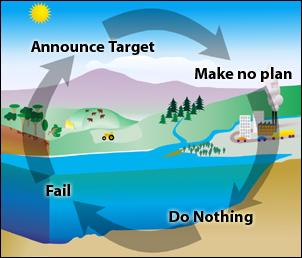
Though with the arrival of the Zero Carbon Act and Climate Change Commission, hopefully this will be the last time it happens.
Meanwhile, there's a dirty little secret in the article about how the target was set, which explains how we got into this mess:
The target was set according to "base case" projections, meaning it was thought in 2016 that New Zealand would reach 64,000 EVs by the end of 2021 without any policy intervention.
In other words, this was a business-as-usual "target", something which National thought was going to happen anyway (and that they could claim the credit for without doing any actual work). But the prediction was very sensitive to the growth rate chosen, and they got the maths wrong, so they failed. Or rather, Labour did, because the other half of this is choosing a target sufficiently distant that someone else can be blamed for failing to meet it (see also: every emissions reduction target ever). Again, the Zero Carbon Act will hopefully change this, by allowing governments to be continuously held to account for both the ambition and delivery of the targets they set. But still, at its core: the government had a soft target, they did nothing to achieve it (National because they didn't want to, Labour because they were apparently incapable). And that's something we should hold them to account for.